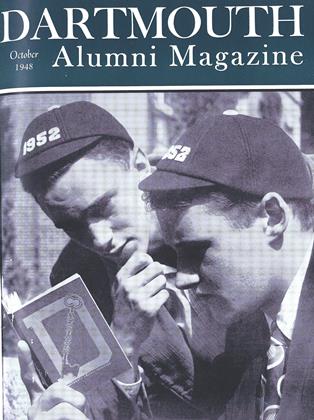bySydney A. Clark '12. Robert M. McBride& Co., 1948. 310 pp. $4.50.
The twelfth and thirteenth centuries gave us, along with other things, the universities, Magna Carta, and gothic architecture. The universities of today are larger and richer than the early ones in Italy; the demands for liberty at the present time are bolder and more articulate than those of the English barons at Runnymede; yet the churches of the twentieth century are far inferior in beauty to those of seven hundred years ago. Nowhere is this more strikingly illustrated than at Paris, where the modern Sacre-Coeur pales in comparison with the Sainte Chapelle and Notre-Dame. And the same is generally true for the rest of the country, for France is the home of gothic cathedrals, these miracles of faith and devotion which, after centuries of time and despite the devastating effects of modern war, still stand as monuments to the skill of the anonymous architects who planned them and as proof of the unquestioning love for Our Lady among the common people whose gifts and labors made possible their construction.
Of the one hundred fifty-one towns in France which at some time in their history have been cathedral towns, about one-third are worth seeing today. These are all described in the present volume, in non-technical language, and in a style simple enough for the average reader. Thanks to his years of residence and travel in France, Sydney Clark is able to give not only a description and appreciation of the cathedrals themselves but also the story of their growth and their historical background. He begins with Paris and Chartres and then swings counter-clockwise around the country, giving special attention to the big six: Chartres, Paris, Reims, Beativais, Amiens, and Bourges. He enlivens the descriptions by anecdotes, legends, and references to his own experiences.
The book is well illustrated and attractively printed. It will be useful both to the veteran traveler as a reminder of the beauty he has seen and to the prospective visitor as an introduction to some of the things he should not miss.
 View Full Issue
View Full Issue
More From This Issue
-
 Article
ArticleShould the Athlete Rate a Preference?
October 1948 By EDWARD T. CHAMBERLAIN JR. '36 -
 Class Notes
Class Notes1918
October 1948 By ERNEST H. EARLEY, DONALD L. BARR, DAVID L. GARRATT -
 Class Notes
Class Notes1921
October 1948 By DONALD G. MIX, ROBERT M. MACDONALD, ROBERT P. BURROUGHS -
 Class Notes
Class Notes1926
October 1948 By E. PAUL VENNEMAN, HERBERT F. DARLINC, ROBERT M. STOPFORD -
 Class Notes
Class Notes1917
October 1948 By KARL W. KOENIGER, DONALD BROOKS -
 Class Notes
Class Notes1912
October 1948 By HENRY K. URION, RALPH D. PETTINGELL, HENRY B. VAN DYNE
Books
-
 Books
BooksAnnals of an Era
October 1932 -
 Books
BooksTHE TEACHER OF TEACHERS.
December 1952 By A. O. Davidson -
 Books
BooksTHE HISTORY OF SEGREGATION.
February 1951 By GEORGE H. KALBFLEISCH -
 Books
BooksGENERAL EDUCATION IN THE PROGRESSIVE COLLEGE,
November 1943 By Irving E. Bender. -
 Books
BooksOPUS POSTHUMOUS: POEMS, PLAYS PROSE.
January 1958 By JOHN L. STEWART -
 Books
BooksWonder and Humility
SEPTEMBER 1982 By Nelson Bryant '46

